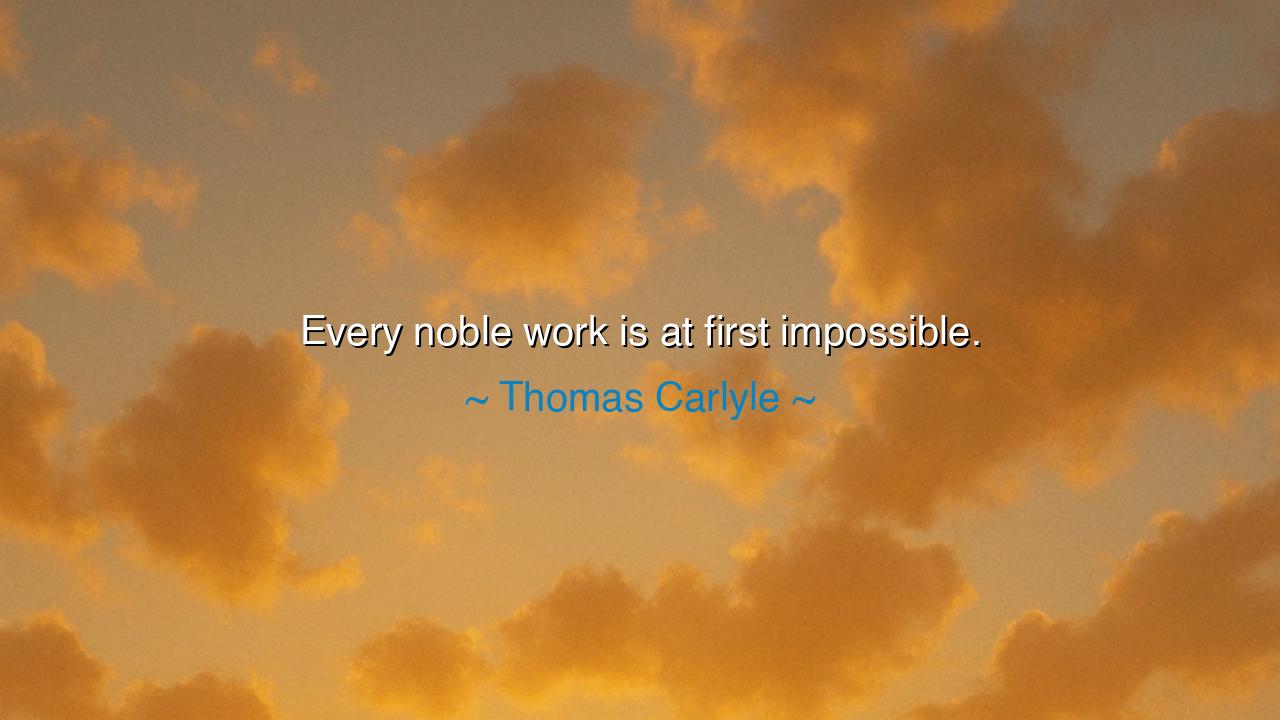
Every noble work is at first impossible.






Thomas Carlyle, prophet of labor and voice of moral fire, once declared: “Every noble work is at first impossible.” In this powerful truth, he reveals the eternal law of greatness—that the higher the work, the greater the resistance it meets at its birth. What seems impossible at the beginning is but the natural weight of destiny testing the strength of the soul that would bear it.
The ancients knew this lesson well. Did not Hercules face labors beyond the power of mortals? Did not Moses tremble before the sea, and Odysseus before the vast unknown? Each noble work began in the shadow of despair, and only by courage, endurance, and divine vision did it pass from dream into reality. What is impossible to the fearful becomes possible to the steadfast, and in this lies the mark of true greatness.
Carlyle’s words also strike against the heart’s weakness. Many abandon their calling at the first sign of difficulty, believing the impossible to be a barrier, when in truth it is the very gate to glory. The harder the task, the more sacred the triumph; the greater the resistance, the more eternal the victory. Thus, to recoil before the impossible is to turn one’s back on the noblest paths of life.
Yet his wisdom carries also hope. For if every noble work begins in impossibility, then the presence of struggle, doubt, and resistance is itself a sign that one walks upon the right road. To feel the weight of the impossible is not to be defeated, but to be called into greatness. Each soul must endure the night of despair before it beholds the dawn of achievement.
Let the generations remember: all that is noble—freedom, justice, truth, love—first appears beyond reach. Yet it is by striving toward the impossible that humanity ascends. As Carlyle teaches, do not fear the task that seems too great, for in wrestling with it, you shall discover the true measure of your strength, and your labor shall echo across the ages as the work of the noble.






GGiang
This quote makes me think about how innovation often begins with a sense of impossibility. The greatest discoveries and achievements were once thought to be impossible. But at what point does 'impossible' turn into 'practical'? How do we distinguish between something that is simply difficult and something that’s truly out of reach? Is the ability to push through impossibility a sign of greatness, or is there a deeper wisdom in knowing when to stop?
LNLinh Ne
The idea that every noble work starts as impossible is a thought-provoking concept, but it’s also intimidating. How many times have I started a project, only to be overwhelmed by the obstacles in the beginning? Is the difficulty of a task really a measure of its nobility, or are there other factors at play? Sometimes it feels like the harder the work, the more worthwhile it must be, but is that always true?
MDVu Minh Dai
Carlyle’s quote strikes me as both a challenge and an encouragement. It’s easy to back away from something that seems impossible, but perhaps it’s in these moments where true progress is made. However, does this mean that all impossible-seeming tasks are worth attempting? Or are there times when we should let go and focus on more attainable goals?
BNDo Nguyen Hoang Bich Ngoc
The notion that all great works start off as 'impossible' is powerful, but it also raises the question of how we define 'noble.' Does this mean that anything worth doing will face opposition, or is it more about the value we place on the task? When does persistence turn into stubbornness, and how do we know when to keep going and when to reassess?
AKAnh Kim
I love how Carlyle highlights the idea that noble work is often met with resistance in the beginning. It makes me think about all the ambitious projects that I’ve put off because they seemed too difficult. But maybe that's the point—if something seems too easy, is it truly worth pursuing? Should we embrace the impossibility and see it as an opportunity for growth?